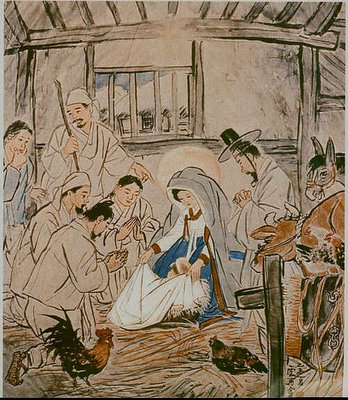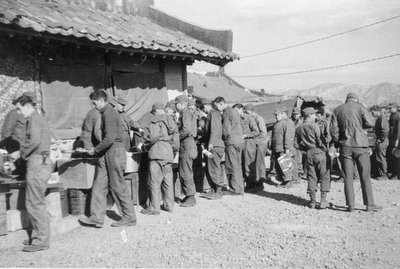And a belated happy Hanukkah!

Here's wishing you and yours a joyous holiday season. And for those of us in Seoul, enjoy the semi-white Christmas.
And last, but not least, for the US military personnel who find themselves thousands of miles away from loved ones while serving in the Middle East, Afghanistan, Korea, Okinawa, mainland Japan, Europe, out at sea, or anywhere else in the world, here's a heart-felt word of thanks this holiday season for your sacrifice and your courage.
For you, a small tribute in the form of a Korean Christmas past:

From this website of Paul Noll:
After we left Taejon we went to Taegu and camped there for a while. On Christmas day we had a Christmas feast with Turkey, dressing, sweet potatoes, pumpkin pie, mashed potatoes, green beans, nuts, cake, celery, cranberry sauce, eggnog, milk, coffee, and other things I have forgotten about.God bless you all!
Tears come to my eyes as I write and think about that wonderful Christmas and the effort the army went to, to make it feel a little bit more like home. The officers served the dinner.
My team had a Christmas tree about 7 inches high and we sang songs and thought of Christmases long ago home with our families.
We wondered about our families and how they might be worrying about us here. We wrote home often but mail was hard to get and send. I did get one package from my brother Mark. It was, so help me, a box of handkerchiefs. I kidded him about that when I got home.
Some of the group got packages of cookies, cheeses or salami. Whenever anyone got something it was always gratefully shared with others in the team. We grew to trust and depend on each other very much. This was one of the few times we spent as a company together. Soon after my team went off to set up a station.
That's an entirely different post.
ReplyDeleteFor now, though, the answer is that the missionaries came here and started setting out to bring modern improvements to the country (Western schools and Western medicine; no, it was not the Japanese authorities that introduced those things). The missionaries tasked Koreans with running the Korean churches, so there was little sense of colonialistic missionary practices. A disproportionately high number of Christians were key figures in the civil independence movement, and later, after colonialism, against military dictatorship.
So in a nutshell, Catholics and Protestants in Korea have had a good image in terms of what is good for the Korean people.
Happy Merry (belated) Cristmas!
ReplyDeleteI wrote that down not to bash the Japanese (I love Japan; I think Korea and Japan can be and should be as close as Canada and America, or at least France and Germany), but to deny credit where it's not due. A lot of Japan apologists do cite the introduction of modern medicine in Korea as a "benefit" of Japanese colonialism and that simply isn't the case.
ReplyDelete